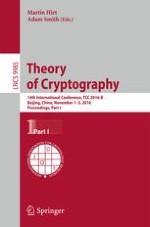2016 | OriginalPaper | Buchkapitel
3-Message Zero Knowledge Against Human Ignorance
verfasst von : Nir Bitansky, Zvika Brakerski, Yael Kalai, Omer Paneth, Vinod Vaikuntanathan
Erschienen in: Theory of Cryptography
Verlag: Springer Berlin Heidelberg
Aktivieren Sie unsere intelligente Suche, um passende Fachinhalte oder Patente zu finden.
Wählen Sie Textabschnitte aus um mit Künstlicher Intelligenz passenden Patente zu finden. powered by
Markieren Sie Textabschnitte, um KI-gestützt weitere passende Inhalte zu finden. powered by
